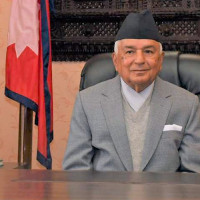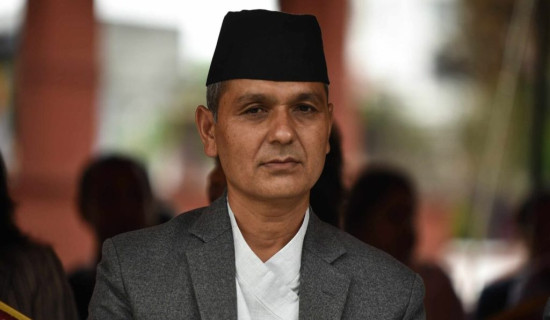- Thursday, 19 February 2026
Principles Matter In Politics
It has been a platitude to say that Nepali politics has been disparaged for some years due to the absence of accountability, rampant corruption, and personal gains through position and power, all with the ulterior motive of amassing wealth. But the practice of unprincipled politics went on without heeding the public concern. Consequently, widespread dissatisfaction among people led a large mass of youths to take to the streets, compelling the elected government to step down. Considering the volatile situation, it may be too early to predict the future of Nepali politics at this juncture; nonetheless, an interim government has been formed to bring politics to a logical end through the upcoming election.
In the context of sudden ripples in the political seascape, some predictable inferences can be speculated. Interestingly, the effects of recent political turmoil can be likened to two ancient myths. One myth is the Greek story of Narcissus, a fabulously beautiful young man, who constantly rejected his admirers and fell deeply in love with his own reflection in a pool of water. Narcissus eventually died as a result of his vanity and unrequited self-love. The tragic fate of the self-praising hero, however, gave rise to a flower bearing his name, Narcissus, alternatively called a daffodil that grew from the place where he perished.
Renewal
Another myth is an Egyptian story that tells of a bird named the phoenix. As the myth goes, the phoenix is a sun-associated immortal bird that cyclically regenerates every five hundred years after being consumed by flames and rising again from its ashes. The phoenix described in this myth is a type of bird that dies for a moment but rises again, symbolising resurrection, renewal, and eternal life in the whole scheme of things.
As Narcissus metamorphosed into a living flower, so Phoenix also continued to live in a renewed form of the same bird. Both of these myths thus symbolise the immortality of not only living beings but also non-living institutions, such as states, governments, and political parties. Nepal, as a sovereign state, is a large institution that also continues to live in one way or another.
The first myth can be connected to the interim cabinet’s dream of establishing a corruption-free governance system and a fair state mechanism. This slogan has gained apex popularity in the context of political decadence. But if they continue to indulge in self-admiration, boasting of their popularity, and fail to meet people’s expectations by demonstrating their competence and performance through wisdom and tolerance to other political forces, they will also soon disappear from the Nepali political landscape, sadly leaving behind only a dream symbolised by a beautiful daffodil that blossoms on earth to our ecstatic delight, signifying nothing for practical life.
The second myth can be linked to conventional political parties that have lost credibility by failing to meet people’s expectations, yet presenting minor achievements as significant landmarks for development. However, as critical thinkers argue, they could not establish a system of governance with significant political stability, let alone lay firm foundations for economic development and social transformation. Therefore, their fall was a natural occurrence. We have yet to see whether they have really fallen. Still, one thing is evident: they cannot restore their lost credibility and revive in politics like the Phoenix resurrects itself unless they rectify their political practices. If they genuinely do as is expected, they will likely rise from the remaining ashes quite afresh.
Given the situation, can we be assured that a new party will be formed in such a short time to forward a genuine political agenda and win the upcoming election, or will there be a significant presence of conventional parties that have long worked to fulfill the promises they made through previous governments? This is the central question that must be fully addressed if we are truly to achieve what we expect. The answer to this question is both yes and no simultaneously. It may be positive if the political actors are wise and considerate. It may also be negative if they repeat the same practice as before.
It is not as easy to fulfill the demands of the dream as it is to raise a slogan for it. Nor is it possible to govern a state without political principles. Any party should act in accordance with its genuine political principles. No matter how much someone denies the need for political principles, it is essential to follow them, at least in a country like ours, where we have only recently begun practicing a multiparty system. Therefore, all political forces must be restructured in terms of organisation, ideology, and principles, ensuring that the fundamental provisions of the constitution remain intact. If this is not done promptly, as people expect, a painful revision of the past is likely to recur.
Furthermore, for a nation to have a valid government, one party should gain a majority of seats in the House of Representatives. If a single party fails to achieve such a majority, two or more political parties can form a coalition government. So is the essence of a multiparty system. In this system, the new political forces should be immediately organised based on political principles and enter the field for fair competition in the election.
Corruption-free governance
In this context, promising Nepali citizens can establish the most progressive political party that represents the spirit of agitating youths. This party should adhere to valid political principles and include a substantial agenda for a corruption-free governance system that promotes economic development and social transformation. For this, all participants of the recent rebellion and other youths should be unified in their spirit and agenda of nation-building.
Likewise, the leaders of conventional political parties should stop being indulged in arrogance and self-praise for their past deeds. There are not many things they should correct. Only a few, such as a disinterested desire for position and power, national interest in decision-making for the distribution of public resources, integrity in ethics, and the constant avoidance of temptation for personal gain, will be sufficient. If the conventional political parties convince the people and regain their confidence, they can easily emerge from the ashes. All political forces, whether new or conventional, should essentially act wisely, keeping public interest at the centre, following the set principles of politics, and abiding by the rule of law.
(The author is the chairman of Molung Foundation. bhupadhamala@gmail.com)
















